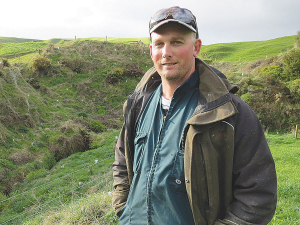Two new awards open to help young farmers progress to farm ownership
Entries have opened for two awards in the New Zealand Dairy Industry Awards (NZDIA) programme, aimed at helping young farmers progress to farm ownership.
 Fed Farmers board member Chris Lewis says there are too many moving parts for farmers to start celebrating.
Fed Farmers board member Chris Lewis says there are too many moving parts for farmers to start celebrating.
A record opening forecast milk price for next season is on the cards but dairy farmers remain wary.
With less than four months to go this season, attention turns to the next season. Banks are forecasting a record opening forecast of between $8.40/kgMS to $8.90/kgMS based on strong global demand for dairy products and a softening New Zealand dollar.
However, farmers point out that there are too many moving parts for them to start celebrating.
Federated Farmers board member Chris Lewis says what the banks are not telling farmers is what figure to use for farm budgets.
"I mean if the milk price will be around $8.50 what should I budget as my farm working expenses - $5 or $6?
"Interest rates are climbing quickly: farm input prices are soaring and then you add rising staff and compliance costs.
"I'm not saying farmers are in the gutter, the milk price is very good but we cannot start celebrating yet," he told Rural News.
Waikato farmer and former Federated Farmers regional president Andrew McGiven agrees, adding that while the opening forecast is positive and will give the industry some optimism, it is still only a forecast and things can change dramatically within a 12-18 month time frame.
He points to 2014-15 when Fonterra announced an opening forecast of $7/kgMS only to slash it later. Farmers ended up with a final milk price of $4.40.
"While most farmers will be trying to pay down debt and ensure farm repair and maintenance is up to date, rising costs and interest rates are reducing profit margins for many.
"My concern would be if the predicted forecast doesn't eventuate, the increased costs are always slower to reduce than any payout reduction," McGiven says.
AgFirst Northland agribusiness consultant Kim Robinson told Rural News that not all farmers will receive the strong milk price as they have fixed some of their milk at lower levels.
"Also, the payments are spread over two years so farmers are not holding their breath as next year's milk price could be lower and reduce the actual cash payments within a season."
She points out that farming costs have soared.
"So, the farm working costs are likely to be up to $1/kgMS higher this season, debt reduction is ticking away, compliance costs continue, there is downward pressure on stock numbers and consequently milk production (for both environmental and lack of labour reasons), and tax will take care of the rest."
BNZ is forecasting an opening milk price of $8.90/kgMS and senior economist Doug Steel believes a softening NZ dollar will influence next season's milk price.
Back in 2014, when global dairy prices were last this high, the NZD/USD was well above 80c, Steel points out.
"This season it has oscillated around the 70c mark and recently dipped into the mid-60s.
"At this stage of proceedings, the latest dip in the NZD will have more influence on next season's milk price than the current one."
Steel says the bank's opning forecast builds in some normalisation on the supply side next season seeing lower global prices over the coming 18 months.
However, that is by no means a given, especially with costs and environmental constraints rising (including offshore).
"Of course, the weather will be important too, as always.
"Tighter than expected supply conditions would present an upside risk to our milk price forecast."
ANZ has lifted its opening forecast to $8.40/kgMS but says it remains cautious.
Additional reductions to costs for forest owners in the Emissions Trading Scheme Registry (ETS) have been announced by the Government.
Animal welfare is of paramount importance to New Zealand's dairy industry, with consumers increasingly interested in how food is produced, not just the quality of the final product.
Agriculture and Forestry Minister Todd McClay is encouraging farmers and growers to stay up to date with weather warnings and seek support should they need it.
The closure of SH2 Waioweka Gorge could result in significant delays and additional costs for freight customers around the Upper North Island, says Transporting New Zealand.
OPINION: The year has started positively for New Zealand dairy farmers and things are likely to get better.
Ministry for Primary Industries (MPI) Director General Ray Smith believes there is potential for an increase in dairy farming in New Zealand.

OPINION: If the hand-wringing, cravat and bow-tie wearing commentariat of a left-leaning persuasion had any influence on global markets, we'd…
OPINION: With Winston Peters playing politics with the PM's Indian FTA, all eyes will be on Labour who have the…